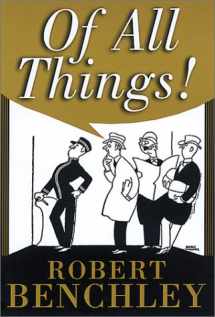
Of All Things! (Common Reader Editions)
Book details
Summary
Description
Book may have numerous typos, missing text, images, or index. Purchasers can download a free scanned copy of the original book (without typos) from the publisher. 1921. Excerpt: ... XVIII SHAKESPEARE EXPLAINED Carrying on the System of Footnotes to a Silly Extreme PERICLES Act II. Scene 3 Enter first Lady-in-Wsiting (Flourish* Hautboys * and * torches *). First Lady-m-Waiting--Wxaf ho!†Where' is1 the* music?" NOTES x. Flourish: The stage direction here is obscure. Clarke claims it should read "flarish," thus changing the meaning of the passage to "flarish" (that is, the King's), but most authorities have agreed that it should remain "flourish," supplying the predicate which is to be flourished. There was at this time a custom in the countryside of England to flourish a mop as a signal to the passing vender of berries, signifying that in that particular household there was a consumer-demand for berries, and this may have been meant in this instance. That Shakespeare was cognizant of this custom of flourishing the mop for berries is shown in a similar passage in the second part of King Henry IV, where * Might be one of the hautboys bearing †box of "trognies" for the actors to suck. he has the Third Page enter and say, "Flourish." Cf. also Hamlet, IV, 7: 4. 2. Hautboys, from the French haul, meaning "high" and the Eng. boys, meaning "boys." The word here is doubtless used in the sense of "high boys," indicating either that Shakespeare intended to convey the idea of spiritual distress on the part of the First Lady-in-Waiting or that he did not . Of this Rolfe says: "Here we have one of the chief indications of Shakespeare's knowledge of human nature, his remarkable insight into the petty foibles of this work-a-day world." Cf. T. N. 4: 6, u Mine eye hath play'd the painter, and hath stell'd thy beauty's form in table of my heart." 3. and. A favorite conjunctive of Shakespeare's in referring to the need for a more adequate navy for England. Tauchnitz cl...


We would LOVE it if you could help us and other readers by reviewing the book
Book review



